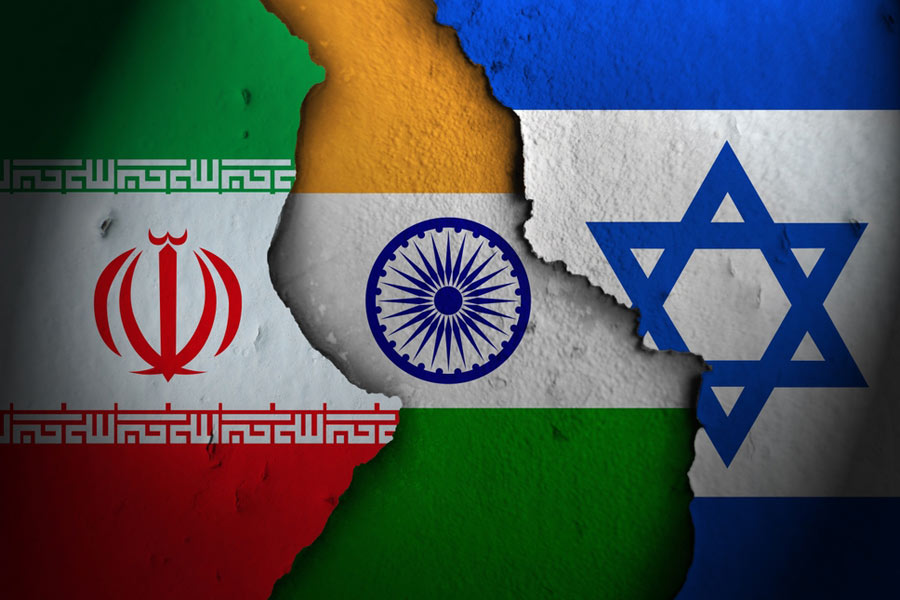Brace For Inflation. Iran’s Attack On Israel Has Deep Implications For The Global Economy And India, Affecting Trade, Oil, And Daily Life. What Should Indian Investors Do?
The recent geopolitical turmoil flared by Iran's brazen attack on Israel has pushed the international community into a state of unease- with over 300 missiles and drones unleashed in the assault, the event has spotlighted the volatility in the Middle East. As the world awaits Israel's response, speculation regarding the potential ramifications of escalating tensions between the two nations has become a significant concern. The uncertainties and concerns loom large over the deep implications of a conflict on global economies and the political scene, particularly in relation to trade, oil markets, and inflation. Investors struggle to address critical decisions due to intensified geopolitical risk in this volatile climate.

Inflation, Disruptions in travel routes, oil price hike and stock market jitters – Iran‘s recent incursion into the geopolitical arena, marked by a daring attack on Israel, has sent shockwaves reverberating across the globe.
Although given the ferocity of the assault – the launch of over 300 missiles and drones, its actual impact on Israel’s infrastructure remained surprisingly minimal.
However, the aftermath of this event has stirred a perceptible sense of apprehension, leaving the international community on tenterhooks as it anticipates Israel’s response under Prime Minister Benjamin Netanyahu’s leadership.
Will Israel opt for retaliatory measures or exercise restraint in alignment with the counsel of its allies – this is what the entire world is asking.
Against this backdrop, the possibility of a potential conflict between Iran and Israel throws a long shadow over global economies and political dynamics.

Oil And Gas Disruptions
Foremost among the concerns is the anticipated disruption to oil and gas markets.
Analysts warn that an escalation in hostilities between the two nations could precipitate a surge in crude oil prices, thereby deepening inflationary pressures worldwide.
Michael Walden, an academic from North Carolina State University, stresses the uncertainty shrouding the situation, emphasizing that the ramifications hinge on the subsequent actions of the involved parties in the middle of an already volatile geopolitical climate.
Market observers, too, are echoing this sentiment, projecting a potential spike in oil prices, with some speculating that prices could breach the $100 per barrel threshold and beyond.
Iran’s status as a pivotal member of OPEC magnifies the repercussions of any disruption to its oil production and exports, exerting ripple effects on global markets.
The vulnerability of the Strait of Hormuz is of particular concern, a vital maritime passageway through which a significant portion of the world’s oil supply traverses.
Analysts caution that any disruption to shipping routes in this strategic corridor could precipitate further escalation in oil prices, compounding the economic fallout.
While initial apprehensions led to a dip in oil prices during early Asian trading sessions, the prevailing sentiment remains fraught with uncertainty, with Brent crude hovering around the $90 per barrel mark.
This precarious equilibrium emphasises the delicate balance upon which global economic stability teeters due to geopolitical turbulence.

Impact On India
In the event of a full-blown conflict between Israel and Iran, India faces a cascade of economic challenges, primarily driven by the anticipated surge in crude oil prices.
As petrol prices inevitably climb, India’s economy would bear the brunt, with far-reaching consequences spanning inflationary pressures, trade imbalances, and strains on the current account deficit, all of which could precipitate downward pressure on the rupee.
Trade And Travel Routes
Beyond oil markets, Israel-Iran conflict threatens to disrupt both trade and travel corridors, compounding India’s economic woes.
Potential disruptions in aviation and shipping sectors loom large, as evidenced by the temporary closure of airspaces by regional players such as Iran, Jordan, Iraq, Lebanon, and Israel.
Such disruptions not only raise operational challenges but also necessitate costly rerouting of flight paths to circumvent conflict zones, thereby driving up aviation fuel consumption and consequently airfares.
The ripple effects of these disruptions extend to India’s domestic aviation industry, with major carriers like Air India, Vistara, and IndiGo already rerouting flights to navigate the evolving geopolitical landscape.
Experts warn that this maneuvering will inevitably translate into higher airfares, worsening inflationary pressures and dampening consumer sentiment, particularly during the crucial summer holiday season.

Impact On Exports
Similarly, the disruption in trade flows poses a significant threat to India’s export-driven economy.
Renewed tensions between Iran and Israel could disrupt India’s exports to Europe, with air freight volumes expected to surge by 10-15%, accompanied by escalations in logistics and insurance costs.
Particularly vulnerable are sectors such as tea and basmati rice, where India’s exports face potential bottlenecks owing to the strategic importance of the region in question.
Likewise, the conflict jeopardizes India’s lucrative basmati rice exports, with Iran alone accounting for a substantial portion of the market.
Similarly, tea exporters, eyeing expansion into Iran, confront the prospect of disrupted trade channels and diminished market access in the wake of escalating tensions.
Impact On Economy
The conflict between Iran and Israel has sent ripples through global financial markets, with potential implications for investors across various asset classes.
In the Indian context, the stock market is poised for a potential downturn in the coming week, driven by concerns over escalating oil prices and heightened investor risk aversion.
As a significant oil-producing region, the Middle East faces the risk of supply disruptions if the conflict intensifies, thereby exerting upward pressure on crude oil prices and fueling inflationary pressures.
This looming scenario spells trouble for emerging markets like India, where higher oil prices can dampen economic growth and worsen inflationary trends, prompting investors to adopt a more cautious stance.
The Shine Of Gold
In such circumstances, the allure of safer investment options such as gold becomes increasingly pronounced, as evidenced by recent market movements.
Market experts warn of a potential shift towards risk-off sentiment, characterized by a sell-off in riskier assets like Indian stocks and a corresponding influx into safe-haven assets like gold.
The prevailing uncertainty surrounding the conflict has already exerted downward pressure on Indian stocks, aggravated by the Federal Reserve’s less-than-expected rate cuts, adding to market jitters.
Should the conflict escalate further, investors may opt to offload riskier assets in favour of safer alternatives, deepening the sell-off in Indian equities.
Gold, traditionally viewed as a safe haven during times of geopolitical turmoil, has experienced a notable uptick in prices, reflecting investor flight to safety.
However, experts caution against indiscriminate investment in gold, noting the potential for heightened volatility and the possibility of prices already reflecting much of the prevailing uncertainty.
Prudence and caution are advised when handling the current market trend, particularly in light of the fluid geopolitical situation and its ramifications for investment strategies.
“Indian equities may encounter transient short-term challenges due to the US Fed’s decision to postpone easing until CY25 and the escalation of commodity prices driven by adverse geopolitical events. While the impact of Fed rates remains minimal due to India’s primarily internally driven narrative of capex resurgence and domestic manufacturing recovery, the prospect of a sustained rally in commodity prices presents a more tangible risk, albeit currently improbable,” stated Seshadri Sen, Head Of Research And Strategist at Emkay Global Financial Services.

What Should Investors Do?
Investors are advised to tread cautiously in response to the evolving geopolitical dynamics.
The escalation of tensions, coupled with Iran’s seizure of a cargo ship, threatens to inject volatility into global equity markets, including India.
As the world awaits Israel and the G7’s response, further conflict escalation could potentially trigger a surge in crude oil prices and subsequent inflationary pressures.
This, in turn, diminishes the likelihood of rate cuts, thereby impacting stock valuations, particularly in the context of elevated trading levels, as highlighted by Shrey Jain, Founder and CEO of SAS Online, India’s Deep Discount Broker.
—-Market participants are urged to promptly factor in these developments by divesting such counters.
—-Additionally, attention is drawn to oil marketing companies, vulnerable to sustained high crude oil prices and constrained margins, aggravated by challenges in passing on increased costs ahead of elections.
—-In managing market volatility, investors may pivot towards the domestic power sector and pharmaceutical stocks for defensive positioning.
—-At lower entry points, notable opportunities may arise in select large-cap capital goods, defense, and infrastructure stocks. To mitigate risk, traders are advised to adhere rigorously to stop-loss mechanisms.
—-Experts caution that maintaining focus on long-term investment objectives is paramount amidst market fluctuations.
—-Avoid reactionary decisions driven by short-term events and instead evaluate portfolio risk tolerance. For risk-averse investors, consider rebalancing portfolios to incorporate a greater proportion of stable assets such as bonds or defensive stocks.
Ali Azhar, a CA and NISM Registered RA, advocates against succumbing to knee-jerk reactions, emphasizing the importance of seizing opportunities presented by market dips to acquire favored stocks at favorable prices.
Equities investors are urged to prioritize well-established companies with robust fundamentals capable of withstanding market turbulence.
Vinay Paharia, CIO of PGIM India Mutual Fund, underscores the ongoing valuation disparities within mid and small-cap segments, driven by optimistic earnings growth projections and policy stability expectations.
—-Large-cap investments and high-growth, high-quality mid and small-cap companies are posited as more favorable options for long-term investors, given limited catalysts for further valuation boosts.
—-Gold emerges as a potential hedge against inflation spurred by rising oil prices, yet caution is advised given prevailing high prices and inherent volatility. Consider a modest allocation contingent upon individual risk profiles and investment strategies.
The Last Bit, the evolving geopolitical tensions between Iran and Israel and the resultant market volatility, investors are urged to adopt a cautious yet strategic approach.
The postponement of US Fed easing and escalating commodity prices pose immediate challenges to Indian equities, necessitating vigilance and prudent portfolio management.
As the global equity markets braces for heightened uncertainty, investors should prioritize long-term investment goals, avoiding knee-jerk reactions in response to short-term events.
Assessing portfolio risk tolerance and rebalancing accordingly can mitigate exposure to market fluctuations. Opportunities may arise in well-established companies with strong fundamentals, particularly within defensive sectors like domestic power and pharmaceuticals.
Additionally, select large-cap and high-quality mid and small-cap companies present compelling investment prospects amidst prevailing valuation disparities.
While gold may serve as a hedge against inflation driven by oil price hikes, cautious allocation is advised due to existing high prices and potential volatility.




